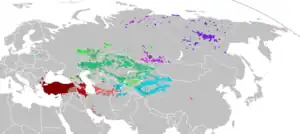Common Turkic languages
Common Turkic, or Shaz Turkic, is a taxon in some classifications of the Turkic languages that includes all of them except the Oghuric languages.
| Common Turkic | |
|---|---|
| Shaz Turkic | |
| Geographic distribution | Southern Europe, Eastern Europe, Western Asia, Central Asia, North Asia, East Asia |
| Linguistic classification | Turkic
|
| Subdivisions | |
| Glottolog | comm1245 |
 Map of the distribution of Common Turkic Languages across Eurasia | |
Classification
Lars Johanson's proposal contains the following subgroups:[1][2]
- Southwestern Common Turkic (Oghuz)
- Northwestern Common Turkic (Kipchak)
- Southeastern Common Turkic (Karluk)
- Northeastern Common Turkic (Siberian)
- Arghu Common Turkic (Khalaj)
In that classification scheme, Common Turkic is opposed to Oghur Turkic (Lir-Turkic). The Common Turkic languages are characterized by sound correspondences such as Common Turkic š versus Oghuric l and Common Turkic z versus Oghuric r.
Siberian Turkic is split into a "Central Siberian Turkic" and "North Siberian Turkic" branch within the classification presented in Glottolog v4.8.[3]
In other classification schemes (such as those of Alexander Samoylovich and Nikolay Baskakov), the breakdown is different.
References
- Lars Johanson (1998) The History of Turkic. In Lars Johanson & Éva Ágnes Csató (eds) The Turkic Languages. London, New York: Routledge, 81–125.
- "turcologica". www.turkiclanguages.com. Retrieved 2022-03-04.
- Hammarström, Harald; Forkel, Robert; Haspelmath, Martin; Bank, Sebastian (2023-07-10). "Glottolog 4.8 - Common Turkic". Glottolog. Leipzig: Max Planck Institute for Evolutionary Anthropology. doi:10.5281/zenodo.7398962. Archived from the original on 2023-09-22. Retrieved 2023-09-21.
Literature
- Johanson, Lars & Éva Agnes Csató (ed.). 1998. The Turkic languages. London: Routledge. ISBN 0-415-08200-5.
External links
This article is issued from Wikipedia. The text is licensed under Creative Commons - Attribution - Sharealike. Additional terms may apply for the media files.
